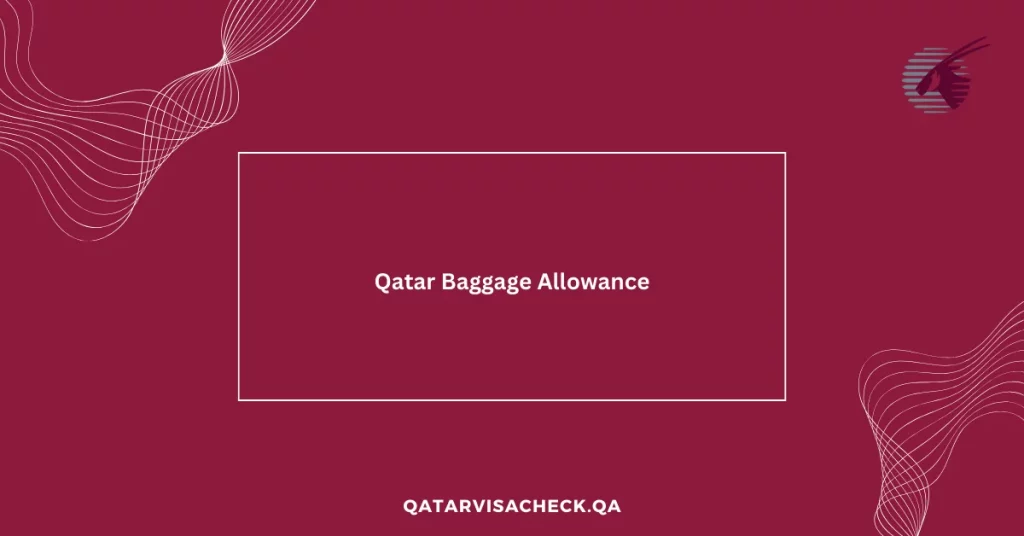In the ever-evolving landscape of international travel, navigating baggage regulations has become an essential aspect of planning a seamless journey. As the world eagerly embraces new adventures, Qatar stands as a captivating destination, luring travelers with its rich cultural tapestry and breathtaking landscapes. However, amidst the excitement of exploring this enchanting nation, it’s crucial to understand the intricacies of Qatar’s baggage allowance policies. This comprehensive guide delves deep into the nuances of checked baggage, carry-ons, weight restrictions, size limitations, and potential excess fees, empowering you with the knowledge necessary to embark on a hassle-free voyage to this mesmerizing destination.
If you want to verify the status of your Qatar visa, you can easily do so by visiting our homepage at Qatar Visa Check.
Navigating Hamad International Airport
Your first encounter with Qatar’s baggage rules will be at the renowned Hamad International Airport. This state-of-the-art aviation hub serves as the primary gateway to the country and has stringent security protocols in place. Upon arrival, your hand baggage will undergo a thorough security screening before you proceed to the baggage claim area. It’s important to note that certain items, including weapons, firearms, ammunition, alcoholic beverages, pork products, and narcotic drugs, are strictly prohibited and will be confiscated without the possibility of retrieval.
After collecting your checked baggage, you’ll pass through Customs, where you’ll have the option to choose between the “Green Channel” for passengers with “Nothing to declare” and the “Red Channel” for those with “Something to declare.” Items that must be declared include, but are not limited to, alcoholic beverages exceeding permitted limits, foreign currency exceeding the allowance, jewelry, precious stones, prohibited and restricted weapons and firearms, illicit materials, more than 400 cigarettes, and personal items and gifts exceeding a value of QAR 3,000 (approximately USD 825). Failure to comply with these regulations may result in confiscation and potential legal consequences.

Understanding Airline-Specific Baggage Allowances
While Qatar’s airports have their own set of regulations, it’s essential to familiarize yourself with the baggage allowance policies of the airline you’ve chosen for your journey. Each carrier has its own unique rules and restrictions, tailored to cater to the diverse needs of their passengers.
Qatar Airways
As Qatar’s flagship airline, Qatar Airways offers a comprehensive baggage allowance system that strikes a balance between weight and piece concepts. For most destinations, the weight concept is applicable, allowing you to check in multiple bags as long as each adheres to the designated weight limit for your class. However, when traveling to and from the Americas and Africa or for flights into Africa, the piece concept is enforced, permitting a certain number of bags within specific weight limits.
To provide a clear overview:
- Economy Class: 20kg (44lb) for Economy Lite, 25kg (55lb) for Economy Classic, 30kg (66lb) for Economy Convenience, and 35kg (77lb) for Economy Comfort. Alternatively, one piece up to 23kg (50lb) for Economy Lite, two pieces up to 23kg (50lb) each for Economy Classic, Economy Convenience, and Economy Comfort when traveling to/from Africa or the Americas.
- Business Class: 40kg (88lb) for Business Lite, Business Classic, Business Comfort, and Business Elite. Alternatively, two pieces up to 32kg (70lb) each for Business Lite, Business Classic, Business Comfort, and Business Elite when traveling to/from Africa or the Americas.
- First Class: 50kg (110lb) or two pieces up to 32kg (70lb) each when traveling to/from Africa or the Americas.
It’s always advisable to verify the precise regulations on your ticket before your departure, as baggage allowances can vary based on your chosen route and cabin class.
British Airways
For those opting to travel with British Airways, the baggage allowance varies based on your travel class and route. The standard checked baggage allowance for most classes is 23kg per bag, with the number of checked bags allowed depending on your booking, cabin class, and Executive Club Tier status.
British Airways offers a handy tool on its website to help you determine your specific baggage allowance for your flight. However, as a general guideline:
- Economy Basic (cabin and handbag only): No checked bags allowed.
- Economy (with checked bag): One 23kg bag.
- Premium Economy: Two 23kg bags.
- Business: Two 32kg bags.
- First: Three 32kg bags.
It’s important to note that all tickets on British Airways, BA Cityflyer, and BA Euroflyer include a cabin bag and handbag, with specific size and weight restrictions.
Pegasus Airlines
If you’ve chosen to fly with Pegasus Airlines, a Turkish low-cost carrier, it’s essential to familiarize yourself with their baggage allowance policy. For domestic flights, the allowance ranges from 15kg for Essentials to 20kg for Advantage and Comfort Flex. As for international flights, the allowance is 0kg for Basic, 20kg for Essentials, Advantage, and Comfort Flex.
To determine your specific baggage allowance, you can easily find the information by entering your Reservation (PNR) Number and Surname on the Pegasus Airlines website.
Air India
Air India, the renowned flag carrier of India, boasts a comprehensive baggage allowance policy for its passengers. For domestic flights, the allowance ranges from 20kg (44lb) for Economy Class Comfort to 40kg (88lb) for First Class. On international flights, including those to Doha, Qatar, the allowance is 30kg (66lb) for Economy Class and 40kg (88lb) for Business Class.
It’s worth noting that Air India has specific dimension allowances for baggage, with Economy Class having a combined dimension limit of 272 cm (107 in) for both pieces, and First/Business Class limiting each piece to a combined dimension of 157 cm (62 in).
Kuwait Airways
Kuwait Airways, the national airline of the State of Kuwait, offers a Standard Free Baggage Policy that caters to the diverse needs of its passengers across different travel classes. For Royal and First Class, the allowance is three pieces up to 32kg each, while Business Class passengers are permitted two pieces up to 32kg each. Economy Class passengers can bring two pieces up to 23kg each, with the exception of fare classes V & T, which allow one piece up to 32kg.
Kuwait Airways also extends additional baggage benefits to its Oasis Club Members, with higher-tier members enjoying increased allowances or overweight waivers.
What Can You Carry as Hand Baggage?
In addition to checked baggage, most airlines allow passengers to carry a certain amount of hand baggage or cabin luggage onboard the aircraft. However, the allowances and restrictions vary among carriers.
For instance, Qatar Airways permits First Class and Business Class customers to carry two pieces of baggage with a combined weight not exceeding 15kg (33lb), while Economy Class customers can carry one piece not exceeding 7kg (15lb). The maximum dimensions for each piece of hand baggage are 50x37x25cm (20x15x10in).
British Airways also has specific guidelines for hand baggage, with a handbag allowance of up to 40x30x15cm (16x12x6in) and a cabin bag allowance of up to 56x45x25cm (22x18x10in), both with a weight limit of 23kg (51lb).
It’s crucial to familiarize yourself with the hand baggage policies of your chosen airline to ensure a smooth and hassle-free experience when boarding your flight.
Additional Fees for Excess Baggage
While airlines strive to accommodate their passengers’ baggage needs, there may be instances where your luggage exceeds the permitted allowance. In such cases, you’ll be required to pay an excess baggage fee, the amount of which varies among airlines and destinations.
For example, Qatar Airways charges fees based on the excess weight, while British Airways charges per additional bag above your designated hold allowance. Pegasus Airlines imposes a flat fee of GBP 65/EUR 75/USD 100 for an overweight bag on a one-way journey, with additional local taxes potentially applicable at certain destinations.
It’s always advisable to check the excess baggage policies and fees with your airline before your departure to avoid any unexpected charges or complications during your journey.
Special Considerations for Infants and Babies
When traveling with infants or babies under the age of one, most airlines have specific guidelines and allowances for their little passengers. For instance, Kuwait Airways permits one piece up to 10kg not exceeding total dimensions of 115 cms or 45 inches for infants.
It’s essential to familiarize yourself with the specific requirements for infant and baby baggage, as these may differ from the standard allowances. Some common rules include ensuring that the baby’s eyes are open and visible in photos, removing any headwear, and using a plain white sheet as a backdrop for their photographs.
Tips for a Hassle-Free Baggage Experience
To ensure a smooth and stress-free journey to Qatar, here are some invaluable tips to keep in mind:
- Weigh Your Bags: Before leaving for the airport, weigh your bags to ensure they comply with the airline’s weight restrictions. This will help you avoid excess baggage fees and potential delays at check-in.
- Label Your Bags: Clearly label your bags, both on the outside and inside, with your name, contact information, and destination address. This will increase the chances of having your luggage returned to you in case it gets misplaced or delayed.
- Pack Essentials in Your Carry-On: Always pack essential items, such as medications, valuables, and travel documents, in your carry-on bag. This will ensure that you have access to these items throughout your journey, even if your checked luggage is delayed or mishandled.
- Familiarize Yourself with Restrictions: Be aware of any restrictions or prohibited items specific to your destination. Qatar has strict rules regarding the importation of certain items, such as alcoholic beverages, pork products, and narcotic drugs.
- Purchase Travel Insurance: Consider purchasing travel insurance that covers lost or delayed baggage. This can provide peace of mind and financial protection in case of any unforeseen circumstances.
- Allow Ample Time: Arrive at the airport well in advance of your scheduled departure time. This will give you enough time to check in, clear security, and make any necessary adjustments to your baggage if required.
By following these tips and familiarizing yourself with the baggage allowance regulations of your airline and destination, you can enjoy a hassle-free and enjoyable journey to the captivating nation of Qatar in 2024.
Conclusion
As the world continues to embrace the joys of international travel in 2024, Qatar emerges as a captivating destination, offering a unique blend of tradition and modernity. However, ensuring a seamless journey starts with understanding the country’s baggage allowance regulations and those of your chosen airline.
By adhering to the guidelines outlined in this comprehensive guide, you can navigate the complexities of baggage allowances with ease, avoiding unnecessary delays, fees, or complications. Whether you’re traveling with Qatar Airways, British Airways, Pegasus Airlines, Air India, or Kuwait Airways, this guide provides invaluable insights into their respective policies, ensuring you arrive at your destination with confidence and peace of mind.
Remember, a well-planned and informed approach to baggage allowances is the key to a truly remarkable travel experience in Qatar. Embrace the adventure, but do so with the knowledge and preparation necessary to make your journey as seamless as possible.

Hey there, I’m Hamza Al-Abdullah, the brains and heart behind Qatarvisacheck.qa. Proudly rooted in the bustling city of Doha, Qatar, I’ve made it my mission to untangle the visa web for fellow travelers. My website isn’t just a hub for visa info; it’s a personalized journey through the often confusing world of travel documents.







